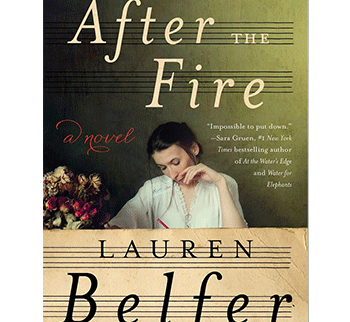At one of the key pivotal moments in this lushly imagined novel, Sara Levy, a Jewish salon hostess of 18th- and 19th-century Berlin, is discussing with Paul Mendelssohn, a longtime family friend, the vicious criticism by Richard Wagner of the music written by Paul’s older brother, Felix Mendelssohn.
“‘I have read Richard Wagner’s screed in the Neue Zeitschrift fur Musik, Das Judenthum in der Musik,’ she said.
“‘Richard Wagner is jealous of my brother.’
“The article had enraged Paul. Coward that he was, Wagner published it under the pseudonym of K. Freigedank, Free Thinker, but his identity as author quickly became an open secret. In his long harangue, Wagner had condemned Felix’s music as lacking in passion and profundity – because Felix was born a Jew.
READ: ESSAYS EXPLORE MYSTERIOUS POPULARITY OF MOURNER’S KADDISH
“‘Wagner wanted my brother’s approval and when he didn’t get it, he plotted this revenge. And a craven revenge too, since my brother is dead and can’t defend himself.’
“Sara waited before replying. Paul felt her giving him time to regain his composure.
“‘Does Wagner represent the future of Europe?’ she asked. ‘I suspect that he does.’
“‘I hope not.’”
This penetrating exchange between the wise, older Levy and the younger, already accomplished Mendelssohn – both of whom were historic figures in the high cultural circles of 18th- and 19th-century Berlin – encapsulates much of the soulful, searing centre of the novel And After the Fire. Many Jews attempted to integrate into German-Prussian society at that time. Ultimately, as we know with such heavy sadness, those attempts were more self-deluding than enduring.
In And After the Fire, Lauren Belfer ties those vain efforts of two centuries ago with events that touch the lives of disparate 21st-century individuals.
The book begins with the discovery by a young American soldier in Germany, near the end of World War II, of a rare, lost cantata written by Johann Sebastian Bach. He bequeaths that manuscript to his niece. She is determined to uncover the circumstances of her uncle’s remarkable discovery as well as the circumstances of the survival of the Bach masterpiece. The investigation surrounding this masterpiece, of course, is the literary device by which the author skilfully resolves the many outstanding historical riddles and ethical questions that course through the novel.
Belfer explores the mystery of the Bach manuscript by essentially writing two stories and connecting them through numerous emotional strands. One story concerns the inheritor of the manuscript and her efforts to make sense of it. The other revolves around the Jewish proprietorship of the manuscript some 250 years earlier.
Assembling as many clues as they can, the niece and her scholarly colleagues tunnel backward in time, so to speak, through their own respective emotional turbulence and intellectual self-doubt, until they “connect with” the men and women who had protected the Bach cantata and passed it forward.
In seeking to discover the provenance of the cantata, the niece must challenge herself and set aside assumptions about her own life. She must explore where her uncle had been at war’s end when he found the manuscript. As a result, she begins to explore her own professional and personal life. Why are there gaps in her family history? Who were the many individuals who were trapped by Hitler’s obsessive hatreds? Can she ever know them? And if she cannot, can she ever truly know herself?
Like all good novels, And After the Fire joins several colourful threads into one literary cloth of remarkable texture and strength. For example, Belfer reflects upon the insidious influence of Martin Luther’s 15th-century teachings upon subsequent societal development of middle Europe. She also provides interesting musicological explorations into the nature and significance of the music of J.S. Bach. Equally compelling, Belfer delves into the role played by Jewish women in the salon lifestyle of 18th-century Berlin.
She explained why in an interview: “The salons of Berlin were different from others because they were organized primarily by Jewish women, and because Christians and Jews, aristocrats and commoners, mingled freely in these salons. This mingling did not mean that Prussian society was free from anti-Semitism (far from it, as my novel explores). But for those in a position to attend the salons, friendships had an opportunity to flourish in the context of discussions of art, music and literature, as well as musical performances. The Jewish salons of Berlin constituted an exceptional moment in German history.”
READ: PLAY RECOUNTS SEXUAL CRIMES OF KILLER RUSSELL WILLIAMS
Indeed, the book is at its best when it depicts the lives of Jews of “high society” in 18th- and 19th-century Berlin. The frequent discussions of the origins, nature and significance of Bach’s music amount to a mini-seminar of noteworthy information. And to the engaging subject of Bach’s music, the author deftly adds descriptions and explanations of the works of the Mendelssohn siblings Felix and Fanny.
Fanny and her considerable talents are likely little known to most readers. To some extent, Belfer’s elaborations grant Fanny’s music a new, as yet undiscovered, life. And yet the famous Mendelssohns are only some of the portraits that the author paints for us. The book is an entry point to a great deal of information about late Renaissance history and music of central Europe.
The many intersecting lines of the plot are imaginatively conceived. Belfer writes of the past in order to explore some of the pressing themes of our modern world such as prejudice, tolerance, acceptance and mutual understanding.
The author has also included a love interest in the story. But to this reviewer, it was unnecessary and even distracting from the richly conceived core explorations of the book. On balance, this is a minor quibble to the overall enjoyment of the novel.
And After the Fire was the winner of the 2016 National Jewish Book Award. It is a thoughtful, intelligent and very satisfying work.
